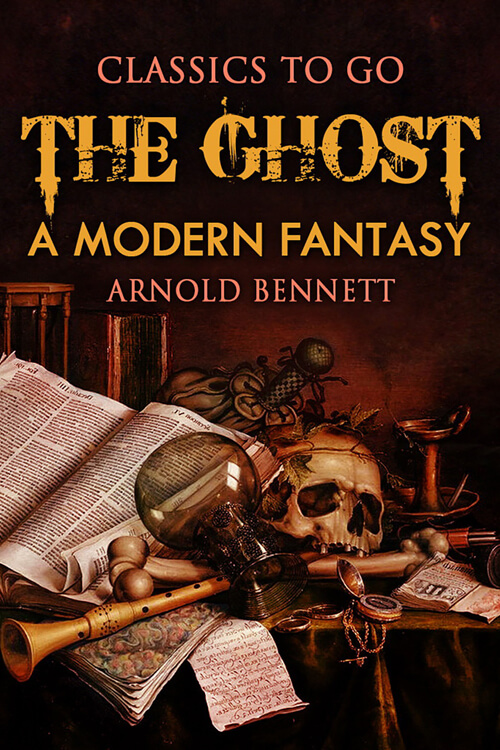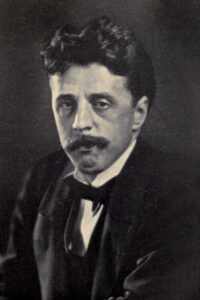
The Ghost, A Modern Fantasy
I blushed. Yes, I blushed before the clerk at Keith Prowse’s and turned to leave the shop. I suppose he thought that as a Christian it was his duty to enlighten my pitiable darkness.
“It’s the first Rosa night tonight,” he said with august affability. “I had a couple of stalls this morning, but I’ve just sold them over the telephone for six pounds ten.”
He smiled. His smile crushed me. I know better now. I know that clerks in box offices, with their correct neckties and their air of continually doing wonders over the telephone, are not, after all, the grand masters of the operatic world. I know that that manner of theirs is merely a part of their attire, like their cravats; that they are not responsible for the popularity of great sopranos; and that they probably go home at nights to Fulham by the white omnibus, or to Hammersmith by the red one—and not in broughams.
“I see,” I observed, carrying my crushed remains out into the street. Impossible to conceal the fact that I had recently arrived from Edinburgh as raw as a plowboy!
If you had seen me standing irresolute on the pavement, tapping my stick of Irish bog oak idly against the curbstone, you would have seen a slim youth, rather nattily dressed (I think), with a shadow of brown on his upper lip, and a curl escaping from under his hat, and the hat just a little towards the back of his head, and a pretty good chin, and the pride of life in his ingenuous eye. Quite unaware that he was immature! Quite unaware that the supple curves of his limbs had an almost feminine grace that made older fellows feel paternal! Quite unaware that he had everything to learn, and that all his troubles lay before him! Fancying himself a man because he had just taken his medical degree…
The June sun shone gently radiant in a blue sky, and milky-bosomed clouds were floating in a light wind above the roofs. The town was bright, fresh, and alert, as London can be during the season, and the joyousness of the busy streets echoed the joyousness of my heart (for I had already, with the elasticity of my years, recovered from the reverse inflicted on me by Keith Prowse’s clerk).
Read or download Book
Arnold Bennett
Enoch Arnold Bennett (27 May 1867 – 27 March 1931) was an English author, best known as a novelist who wrote prolifically. Between the 1890s and the 1930s, he completed 34 novels, seven volumes of short stories, 13 plays (some in collaboration with other writers), and a daily journal totaling more than a million words.
Biography.
He wrote articles and stories for more than 100 newspapers and periodicals, worked in and briefly ran the Ministry of Information in the First World War, and wrote for the cinema in the 1920s. Sales of his books were substantial and he was the most financially successful British author of his day.
Born into a modest but upwardly mobile family in Hanley, in the Staffordshire Potteries, Bennett was intended by his father, a solicitor, to follow him into the legal profession. Bennett worked for his father, before moving to another law firm in London as a clerk, aged 21. He became assistant editor and then editor of a women’s magazine, before becoming a full-time author in 1900. Always a devotee of French culture in general and French literature in particular, he moved to Paris in 1903; there the relaxed milieu helped him overcome his intense shyness, particularly with women. He spent ten years in France, marrying a Frenchwoman in 1907. In 1912 he moved back to England. He and his wife separated in 1921 and he spent the last years of his life with a new partner, an English actress. He died in 1931 of typhoid fever, having unwisely drunk tap water in France.
Many of Bennett’s novels and short stories are set in a fictionalized version of the Staffordshire Potteries, which he called The Five Towns. He strongly believed that literature should be accessible to ordinary people, and he deplored literary cliques and élites. His books appealed to a wide public and sold in large numbers. For this reason, and his adherence to realism, writers and supporters of the modernist school, notably Virginia Woolf, belittled him, and his fiction became neglected after his death. During his lifetime his journalistic “self-help” books sold in substantial numbers, and he was also a playwright; he did less well in the theatre than with novels but achieved two considerable successes with Milestones (1912) and The Great Adventure (1913).
Studies by Margaret Drabble (1974), John Carey (1992), and others have led to a re-evaluation of Bennett’s work. His finest novels, including Anna of the Five Towns (1902), The Old Wives’ Tale (1908), Clayhanger (1910), and Riceyman Steps (1923), are now widely recognized as major works.






